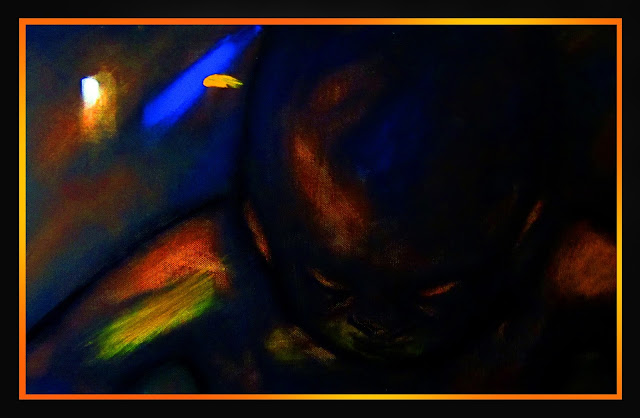What makes something "real"?
If it can be seen, touched, smelled, heard, and or tasted?
These are our common senses and for a long time, those were our "guides"when it came to establish if something was real or not.
So what is a "sense"? "a faculty by which the body perceives an external stimulus; one of the faculties of sight, smell, hearing, taste, and touch."
Nowadays however, most scientists agree that there are other "things" that makes us decide whether something is real or not.
For some of us, something is real if it can be supported by facts, scientifically verified evidence, rigorous scientific scrutiny, and in some cases, all the above plus statistics.
This can be somewhat problematic, because memory, thought, consciousness, love, imagination, inspiration, experiences, feelings etc.etc......for most of us seem very real, although at this moment in time, all the above would be virtually impossible to subject to the scientific method, and if one was to call them "facts", a hefty debate would follow. Take a "thought" for instance, our thoughts are very real to us, some of us may even say "it's a fact that we all have thoughts". Scientifically, I am not so sure it can be called a fact, philosophically,...perhaps?
While chatting with someone on-line recently, someone said: "Seeing is believing"... I have heard that phrase used many times, but this time I decided to bite: "Hmmm....for me, that seems like an oxymoron" I said and ducked for cover. (In my experience, challenging that phrase often tend to make folks quite animated.)
"What do you mean, oxymoron?" he/she asked then continued "so you're into blind faith then?"
"Blind faith, in my view, is also an oxymoron" I answered then continued "an oxymoron is like a figure of speech in which one term contradicts the other as in "an open secret, or minor crisis, or pretty ugly" for example. If you can see something with your eyes, you don't need to believe anything, the thing you see is before your eyes and so "sight" verifies it as actual. Believing something, you see nothing in actuality, but in your "minds eye", it can be experienced as a "reality."
"You're an idiot" he/she said and sadly, with those words the conversation ended.
Regardless whether we can substantiate and or verify something as real from a scientific stand point,
most of what we experience in our lives, we experience as real.
Our thoughts seem very real, so does our feelings, but just like consciousness and love, we would be hard pressed to provide any scientific proof/evidence of such. But, our feelings, thoughts, love and consciousness affect our actions and behaviours, and those in turn can perhaps be viewed as evidence for their existence. We may not "see" the wind, but we see its affects, we may not see thoughts, but we see how thoughts affect someones behaviour, we may not see love, but we see how love affect someones behaviour, we may not see others experiences, but we see how they affect their behaviour, and so on. Logic and reason, rational thinking and reasoning has brought human development and progress far, but it has its limitations, in my view.
Science, wonderful as it is, is often "speechless" when it comes to comforting someone who is experiencing the loss of a loved one, a broken heart, a confused mind, loneliness and or isolation, social anxiety and or depression. Far more helpful (in my opinion) than facts and evidence, is someone who listens, shares their experiences, and offer a hand of friendship and compassion.
What makes something "real"? That, to me, seem to depend very much on how one defines the word real. So, let me offer a few suggestions: existing or occurring as fact, actual rather than imaginary, a concept for things that on a collective basis we agree on are real such as for instance: tree, car, traffic light, house, lamp post, water, etc.etc. We may all have differing views on the colours, the sizes, and so on, but we may all still agree: "that's a tree, because it has a trunk, branches, roots and leaves. We can see it, hear it (when its windy), smell it, touch it, and taste it (especially if its a fruit tree)."
Scientifically speaking, a heart may be a "pump, a muscle, etc....." and a brain more or less "water and fat", but that's not what we commonly mean when we say "he is heart broken, she has a soft heart, he is hard heartened, my heart tells me I love him/her, he/she had a heavy heart, etc. etc." and reminding someone who is heart-broken that a heart is a mere pump, is usually not received very well albeit a factual statement. Even if we can't substantiate our experiences, thoughts, feelings, imaginations etc. scientifically, we experience such as real nonetheless.
Pondering these things has lead me to the notion that there are things that human beings as a collective experience as real, but there are also things that on an individual level we experience as real that are obvious and actual only to each of us individually. Two realities, a collective reality in which we function and interact with each other, an individual reality in which our very own belief systems, perceptions and interpretations are obvious and actual only to us, and as far as I can ascertain, we exist in both simultaneously, although occasionally, .....they do seem to overlap.
"Reality is merely an illusion, albeit a persistent one." (Albert Einstein)
"Life is not a problem, but a reality to be experienced." (Soren Kierkegard)
(The painting, is depicting a little African boy as imagined by me.)

No comments:
Post a Comment